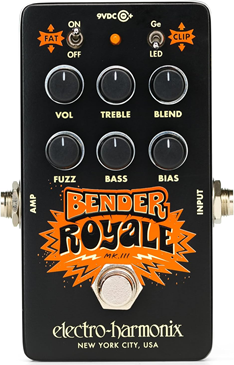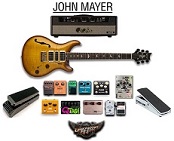Sadly, great tone is one of those things that's all too often over thought by guitarists. In this article, we discuss the importance of guitar tone and give some tips on how to get it...

There's a sad reality plaguing most guitarists--we're not the glamorous rockstars we believe ourselves to be. That's right folks, most musicians are no different than your average bank teller, burger chef, Laundromat attendant, etc.; they're just average working stiffs struggling to pay the bills (okay, okay, musicians are clearly struggling more than your average Laundromat attendant). All kidding aside though, the most important thing aside from your chops that will keep you working is... TONE. Not just tone, GREAT tone. To be honest, great tone is probably more crucial to your career than the Yngwie inspired six-string sweep arpeggios you've been working at since you heard "Rising Force" back in 1984. Sadly, great tone is one of those things that's all too often over thought by guitarists. We dream of the monster rigs we see in guitar mags that involve absurd collections of cabinets and rack gear, but somehow fail to see that given the gigs that most of us play, this isn't necessary (remember, we're NOT rockstars). These multi-thousand dollar rigs are cool to drool over, but are seriously impractical for the functioning, working guitarist. Imagine the horror of the bride and groom if you showed up at their wedding with a face melting wall of Marshall cabinets powered by three separate Mesa Boogie heads with a fully loaded 16 space rackmount unit loaded with gear that would make Steve Vai jealous.
Our lust for gear can frequently get in the way of achieving the purest, most desirable, and listenable guitar tone. The secret to great tone is really a three fold, simplistic approach: grab an axe your comfortable on, an amp capable of achieving an appropriate amount of gain for your band or gig situation, and whatever you might need to augment this. Remember, just because something is cool doesn't mean you need it for your primary rig. Multi-effects units are great but unless you're spending big bucks it's likely that you're getting in the way of your main objective. Worse off, you could be throwing your hard earned money in the wrong direction. With a limited amount of funds you'd be better off starting at the top with a great amp. At that point, anything you add to it will be enhancing something already high quality, rather than serving to cover up the imperfections that may have been brought about by thinking you could cover the shortcomings of a $100 solid state amp with a $900 multi-effects unit that hooked you into the purchase with a single 12ax7 preamp tube. Music stores make a fortune selling gear people think they need but would probably have no use for if they started out with a great amp and a great guitar. To put it crassly, you can't polish a turd. Using a $5,000 pro-quality microphone on a $50 guitar from your friendly neighborhood department store is only going to sound like a poor sound source engineered extremely well. If you're struggling with where to start as far as gear acquisition, the logical place would be with what's most important: your guitar and your amp. If you consider yourself a pro then your gear and your approach to using it should suggest nothing less. When figuring out what you can or can't afford, be realistic about it. You don't need to spend a fortune on great tone but the reality is that pro gear costs a bit more money than the average soccer mom is willing to shell out for her kid that finally made the honor roll. I've always taken this approach to understanding tone and where it really comes from (listed in order of importance):
1) The Amp: Your amp is probably the single most influential thing on your overall sound. There's no compromising the greatness that a high quality, tube amp can offer. They'll provide you with shimmery cleans, the right amount of gain and volume, and tone that's so good it really becomes a matter of preference rather than quality what you dial in. Start with a great amp and work backwards.
2) The Guitar: This is partially a matter of preference and partially a matter of product quality. It's no secret that some guitars are far inferior to others, some are iconic in their sound and image, and some will surprise you for better or worse. Some guitars play differently and some guitarists play differently depending on what axe is in their hands at any given moment. I don't rock out on a Les Paul the way I do on a Strat or a Jackson. However, the component of preference lies not only in the playability of the instrument, but in all the other little things. If you're looking for a guitar to really push the tubes of whatever amp you're plugging into gain-wise, you're not going to reach for a low-output, single coil configured guitar. Consequently, playing an Ibanez loaded with the most outrageous high gain pickups hardly seems practical if your main gig is a jazz quintet. Know what setting your working in is the key to tonal success. When all else fails, favor versatility. This will leave you with no regrets down the road should you end up shifting musical gears or if you happen to end up booking a lot of session work for varying outfits.
3) Your fingers: Yes folks, your fingers. This is that special something that separates one guitarist from the next. That intangibility that can show itself when one guy plays the same guitar into the same amp with the same thing(s) in the signal path. Your fingers are what make you sound like, well... you. The way you play, your touch, how you attack the strings on both your left and right hands (yes, your pick matters too); it all matters when it comes to what's leaving the speakers of your amp. How about it, you're a unique and beautiful snowflake.
4) What's in the signal path: This seems pretty self explanatory, but it's also important. Anything you put in front of your amp (or in its effects loop) will play a role in coloring your sound. Just bear this in mind and remember to only put what's really necessary given your situation. I don't know too many guitarists who absolutely need a ring modulator or a micro-synth as part of their sound, but a wah pedal, overdrive or distortion, and perhaps a chorus or delay pedal can probably take your tone to a whole new place. Save the esoteric stuff for the studio unless it comes out to play pretty frequently. At that point it's obviously pretty important.
Ultimately, your ears should be your guide. You didn't come this far as a guitarist because you were tone deaf so don't become deaf to great tone by being blinded by cool gear. Once you've achieved tonal Nirvana more gigs will come your way and then you can buy all the rack gear, esoteric stompboxes, weird shaped guitars, and any other specialized stuff you can think of. And when building your own live rig think very simply to yourself, "Do I want it because it's cool, or do I need it because it's important?" The key to great tone, really starts with learning to be honest with yourself about what you need to do your job as a great guitar player.
Article by UberProAudio freelance writer and professional musician/instructor Kevin Williams



